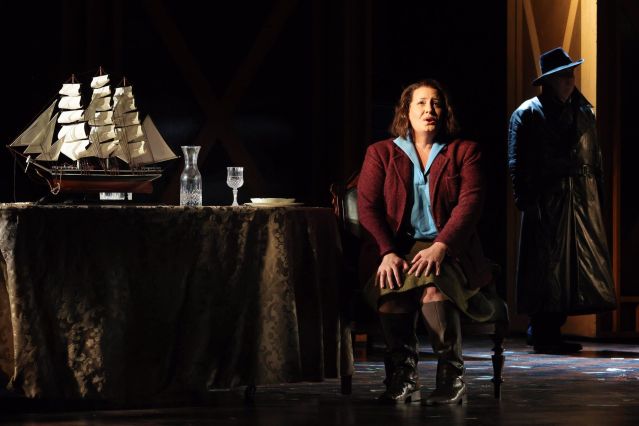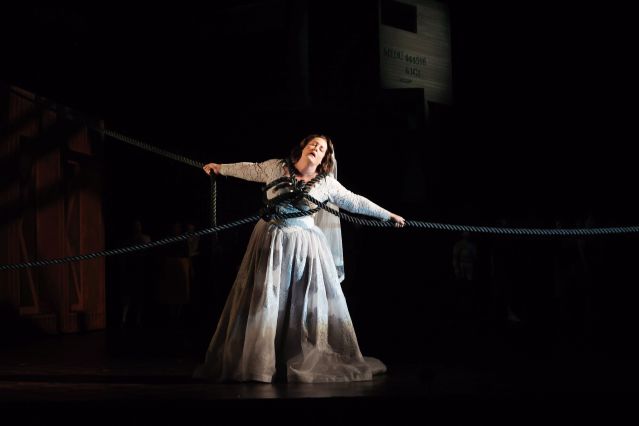Relationships
What We Can Learn About Obsessive Love From "The Flying Dutchman"
Wagner's opera holds a mirror up to our reckless behavior.
Posted July 11, 2023 Reviewed by Abigail Fagan
By all accounts, Richard Wagner, whose musical and theatrical brilliance continue to have a powerful impact on opera, film, and stage, was a horrible human being. He betrayed those who supported him, manipulated, lied, and was an anti-Semite. How, then, to explain how the theme of love permeates all of his work?
Many are turned off by the length, density, and complexity of Wagner’s work, but I have to admit that I am a mesmerized member of the Wagner fan club. I recommend starting with The Flying Dutchman because it’s a reasonable two-and-a-half hours long, and the story is accessible. There is no better venue to start than the Santa Fe Opera, whose current production is hands-down the best I have seen.
But let’s go back to Wagner’s depiction of love. What kind of love is it? The Flying Dutchman is about a ship’s captain who has a beautiful and loyal daughter named Senta. She has a kind, loving suitor named Erik, but is emotionally unavailable because she is obsessed with the story of another captain who is condemned to sail the seas and never find home, peace, or the release of death. The only way he — the Flying Dutchman — can be freed of his curse is to find a woman who will love and be faithful to him unto death. Senta believes that she is that woman.

Since this is opera, where anything can happen, the Flying Dutchman and his ghostly crew appear, and Senta’s father offers his daughter’s hand in marriage in exchange for unimagined wealth. Senta’s dream has come true, and she delivers exactly what the Flying Dutchman needs — her total loyalty unto death. In most productions of The Flying Dutchman, out of love she casts her own life upon the waves and leaps to her death in an attempt to save him. In the Santa Fe Opera’s version, she strangles herself in the ships’ ropes. And this German Expressionist-styled production suggests that the Dutchman sails off into the sunset, perhaps to be joined in the ethers or the afterlife by Senta. She has fulfilled opera’s most extreme pre-nuptial agreement.

Above the roar of the crowd at curtain call, I heard my husband asking, “So what was in it for her?” And it was echoed by the young woman seated in front of me inquiring, with incredulity, “So she obeyed her father and then died for the Dutchman? What did she get out of that?”
The pragmatic answer is: nothing. She doggedly obeyed her father and became obsessed with a story she had heard. She suffered from hopeless romantic idealizing, and saw her noblest calling as self-sacrifice for a man she didn’t even know and a story that might only have been a fable. The Dutchman got released from his curse, and she got relief from obsessive love and self-denial although she never realized she suffered from either. Her life was devoted to relieving a man she’d never met from his suffering. She is the operatic poster girl for depending on others and having a weak or absent sense of self.
Of course, this is purely speculation, but was this the kind of slavish devotion Richard Wagner thought was love? Was his own ideal a woman who had no goal in life other than to relieve the pain of a suffering man? He didn’t invent the legend of the Flying Dutchman, but he imagined and conjured the woman who would die to liberate the captain of the ghost ship from a fateful curse.
I wish obsessive love were limited to the magical realm of opera but, alas, it is an emotional spider that has snared many in its web. I think of one woman I know especially, who was obsessed with a man who made it patently clear to her that he didn’t love her, would never love her, and treated her coldly and with disdain. She reasoned that he just needed to be loved, and it was her calling to love him without reservation until he came to his senses and realized that she was the woman he wanted. He moved away, metaphorically sailing the seas, but she continued to think of him constantly and followed his social media posts and loved him to the exclusion of any other potential partner. She was certain he would return to her.
I can’t say with any certainty that Wagner was holding a mirror up to himself, but he created a magnificent work of operatic brilliance that holds a mirror up to our own reckless obsessions and gives us a safe-distance option of really looking at where they lead.


